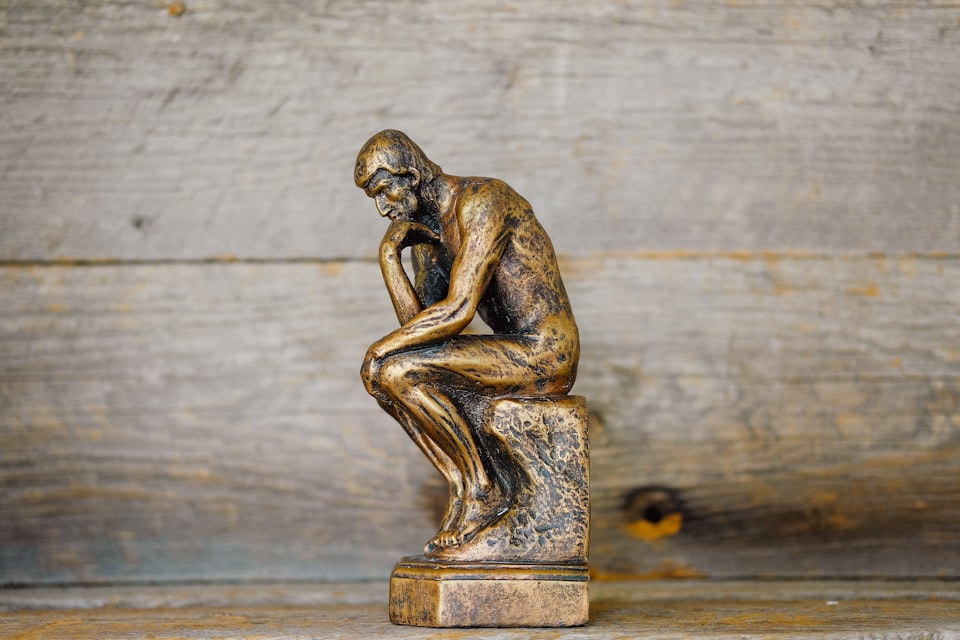This is chaos and confusion. This is me thinking out loud. These are some of the things that have been bugging me for a long time. So, if you are in a state of confusion, I recommend you stay away from this post. If you have some clarity, I ask you to enlighten me. If you are in neither of these zones, join the chaos!
Ignorance is bliss. And that's for a reason. It is easy when you are just going through life as it is. It is comfortable. You have your ups and downs, success and failures, give yourself up to the flow and take it as it happens. But the moment you try deliberately to make yourself better and get out of your comfort zone, your past catches up with you. Because these are the moments you pause and take a better look at yourself. You start going down a rabbit hole of "How can I be a better person?", "How can I unlearn some of my past behaviors and try to improve?" When you have this thought, you naturally go towards this path called Self-Development. I've been on this path for a couple of years, and I can say it's not for the faint-hearted.
Forget horror movies and psychological thrillers. The moment you actually try to improve yourself and confront the monsters under your bed is when the real scary shit starts. It gets your heart pumping and your adrenaline running. This is what keeps you awake at night. Anyone who has tried to improve themselves realistically can relate to what I'm about to say. When you start to reason for your past, you realize that most of it can't be justified. We are stupid in all senses of the word. We have made plenty of mistakes, yet we're still standing strong. Our past is essentially where our strengths come from.
Improving yourself has much more to do with acknowledging and coming to terms with your past than improving your present. In this journey, figuring things out yourself is time-consuming, so you tend to gravitate towards philosophy and psychology instead of reinventing the wheel. These things make you rethink your life and reality as you know it is put into question. In the numerous podcasts, books, and YouTube videos I've consumed over the years, I found some discrepancies, and they haunt me.
Whom you follow
Some people follow one or two people specializing in self-improvement, while others follow multiple people. This includes authors, entrepreneurs, productivity experts, and the like. After a while, I started following some of these people and noticed different patterns and problems. The problem with following one person is that you tend to get hooked on their views and philosophy. They try to preach/teach something that aligns with their worldview and their reality. As enlightening as it may seem at the beginning, following and listening to them restricts you, in a way, to their way of thinking. Though it may sound rational and transparent, more often than not, it is still limiting.
On the other hand, if you follow a bunch of people in a specific area, they have different opinions on the same thing, which are often contradictory. Hell, when Newton and Einstein could contradict each other on Gravity, who are we? I'm getting to the point that following one person restricts you to their ideology while following many people leads you to confusion. Which one to follow? I don't know.
Long-Term Thinking Vs. Living In The Moment
People like Warren Buffet and Naval Ravikant, who have accumulated health, wealth, and wisdom in the long term, emphasize thinking in the long term while building health, wealth, and relationships. They talk about the shortcomings of instant gratifications and short-term thinking and how they might impact an individual. Still, other people like Austin Kleon (the author of Steal Like an Artist and Show Your Work) and Mark Manson (the author of The Subtle Art of Not Giving a F*ck and Models) have these mindful ideas like living in the moment and split-second decisions.
How can a person think in the long term and be present at the moment simultaneously? Which is important, long-term thinking or mindfulness? These two things seem contradictory. How can a person be impulsive and be present in the moment while thinking in the long term? This baffles me. Bringing a third dimension to this, what about the past? Doesn't that count? We are the product of our history. When we think and act in the long term (future) while considering being in the present, should we forget about our past? Is it even feasible? Don't our past, present, and future interlude with each other? I realize I'm starting to sound like the narrator of Dark (watch it on Netflix if you haven't), but it is concerning. If so, how can a person focus on one thing and ignore the rest?
Intentions Vs. Actions
In my personal experience, our actions play a vital role that surpasses our intentions. In friendships, relationships, and other social settings, irrespective of our intentions, our actions matter and radiate to the other person. The main reason is that our actions are quantifiable. Though our intentions are good and pure, our actions ultimately reflect our personality to the outside world.
On the other hand, while on the receiving end, though someone's actions are hurtful or contradicting, when we know that their intentions are good, we tend to overlook them. We think that "their heart was in the right place." I asked a friend of mine, who is calm and composed most of the time — "How do you keep it together?" Their answer was enlightening — "When somebody does something, try to see their intentions behind it. If it is well-intended, they probably mean well but don't know how to express it. This puts me at peace." This begs the question as to which is important. Actions or intentions? I'm confused.
How? Vs. Why?
Consider these two sentences:
- It's not about how you do it but why you do it.
- It's not about why you do it but how you do it.
The problem is that both sentences make sense. This ties back to intentions and actions. The intention is, "why do you do it?"; action is "how do you do it?" This is very vague and incredibly difficult to apply in real-life scenarios. The moment you think "why you do it" and do something, it brings the "how did you do it?" into the picture. The moment you think "how you do it" and do something, it naturally begs the question of "why did you do it?". How to choose what in which scenarios? It is super tricky.
Final Thoughts
Consuming others' advice, help, or wisdom is easier than applying them. No matter how much you consume, it is useless unless you apply them. In real-life situations, your mind runs through everything you have consumed, imbibed, and taken in, but picking which one to apply is incredibly hard. When we advise someone, it is hard to see how they will apply them in which situations. When we receive advice, it is crucial to understand the context in which it applies. Either way, this is the whole point of getting out of your comfort zone. The ultimate truth is nobody has figured it all out, no matter how they appear. Everybody is winging it based on their best judgment. Food for thought, I guess. If you have answers to or resonate with any of my questions and want to dive deep, let's chat. Thanks for reading. Cheers!



